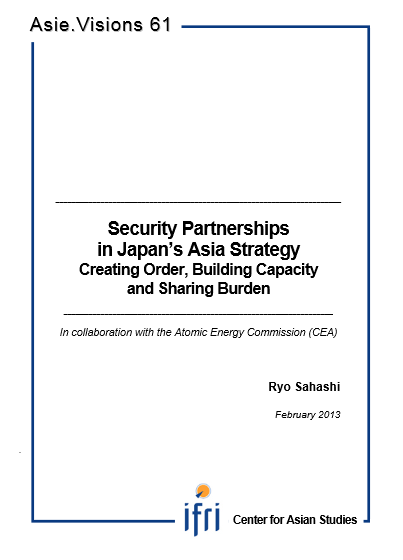Security Partnerships in Japan's Asia Strategy: Creating Order, Building Capacity and Sharing Burden

During the last decade, Japan has sought partnership with many Asian nations - the drive remaining strong regardless of ruling parties. Newly elected Prime Minister Shinzo Abe of the Liberal Democratic Party of Japan is to continue this trend under the name of ‘value diplomacy".
Partnership is being sought to sustain regional order at a time of geopolitical shifts in a rapidly developing Asia, through coalition-building among like-minded countries. Also, partnership between major and smaller powers is aimed at enhancing the capability to cope with both traditional and non-traditional security threats. America’s regional partners, particularly Japan and Australia, understand well this role of partnership and regard it as an important tool of diplomatic statecraft and burden sharing.
On the other hand, security partnership is limited in so far as there are varied perceptions of and policy priority concerning China, a crucial trade partner for most nations in Asia. Also, such partnership will not sufficiently meet the challenge from the new spectrum of warfare, such as anti-access measures. Finally, without having China in the web of security cooperation, the predictability of the security environment would not be improved and the possibility of power competition would not be mitigated.
This paper analyses Japanese security partnership with Asian nations. First it introduces the concept of partnership in the context of Asian security and Japanese strategic thinking. Then, it looks at and develops the case of Japanese partnership with Australia, India, South Korea and Southeast Asian nations. Finally, it highlights the limitations of partnership and provides a vision for the future.

Available in:
Regions and themes
ISBN / ISSN
Share
Download the full analysis
This page contains only a summary of our work. If you would like to have access to all the information from our research on the subject, you can download the full version in PDF format.
Security Partnerships in Japan's Asia Strategy: Creating Order, Building Capacity and Sharing Burden
Related centers and programs
Discover our other research centers and programsFind out more
Discover all our analysesThe U.S. Policy Toward Taiwan Beyond Donald Trump: Mapping the American Stakeholders of U.S.-Taiwan Relations
Donald Trump’s return to the White House reintroduced acute uncertainty into the security commitment of the United States (U.S.) to Taiwan. Unlike President Joe Biden, who repeatedly stated the determination to defend Taiwan, President Trump refrains from commenting on the hypothetical U.S. response in the context of a cross-Strait crisis.

China’s Strategy Toward Pacific Island countries: Countering Taiwan and Western Influence
Over the past decade, China has deployed a diplomatic strategy toward the Pacific Island Countries (PICs). This strategy pursues two main objectives: countering Taiwan's diplomatic influence in the region and countering the influence of liberal democracies in what Beijing refers to as the "Global South."

Opening up the G7 to South Korea to Address Contemporary Global Challenges
The G7’s global influence has diminished as powers like China reshape international governance through initiatives such as BRICS and the Shanghai Cooperation Organisation (SCO). With the G7 now representing just 10 per cent of the world’s population and 28 per cent of global GDP, its relevance is increasingly questioned.
Expanding SPDMM as a pivotal institution in the Pacific – A French perspective
The South Pacific Defence Ministers’ Meeting (SPDMM) is the only forum that brings together defense ministers from the wider South Pacific — including Chile, which is hosting it for the first time. This heterogeneous group of countries with varying resources, capacities, and interests — Australia, Chile, Fiji, France, New Zealand, Papua New Guinea (PNG), and Tonga — are united by their shared determination to strengthen cooperation on maritime security and humanitarian assistance and disaster relief (HADR) activities.







